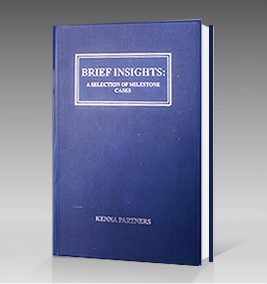Brief Insights: A Selection of Milestone Cases is a careful selection of cases which celebrate the progressive matters brought by litigants before our Courts, the persuasive arguments of Counsel and the well-reasoned (and in some cases) landmark decisions that have enriched legal practice and modern legal history in recent times. My colleagues and I take special pride in sharing the very enlightening cases in this book.
Decades of experience in legal practice, has given us the opportunity to conduct several cases touching on various areas of law. It was in the aftermath of the excitement of concluding one of such cases, which ended in a landmark decision at the Court of Appeal, that this book was conceived. In this particular case – National Oil Spill Detection and Response Agency (NOSDRA) v Mobil Producing Nigeria Unlimited, the Court of Appeal decided that it was unconstitutional and a violation of the right to fair hearing for administrative and regulatory bodies to act as both judge and complainant in the same case and impose fines on persons without any judicial decision as to the guilt of such defendant. This decision of the Federal High Court per Ojukwu J. was indeed a bold and progressive one which asserted the powers and authority of the judiciary and the supremacy of the Constitution. It is no doubt that the Court of Appeal affirmed that decision.
The milestone cases selected for a good reading and learning experience touch on the practice and procedure of the Courts relating to matters of service and abuse of court process, company law, landlord-tenant relationship, fundamental human rights and maritime amongst others.
One of the first cases discussed in the book is with respect to service of court processes as a matter that could prove fatal to a suit. The service of court processes on corporations has been a subject of debate and in Dickson Atim & Another. V Mobil Producing Nigeria Unlimited, where the Court pronounced on the appropriate mode of service of originating processes on corporations – whether at the registered address or on a principal officer at the registered address.
Another area of procedural law to which many are susceptible to error and which is often a subject of much controversy in legal practice is Garnishee proceedings. Where the Garnishee is a public person, certain pre-conditions must be satisfied for the proceedings to be valid. The Court in Innoson Nigeria Limited v Nigerian Customs Board explained the rationale behind this condition precedent and the options available to a judgement creditor wo was unable to satisfy same.
Corporate law practice remains a vibrant field of law and the Court have pronounced on several disputes between shareholders and the management of companies. The cases of Otunba Ojora V. Agip Nigeria Plc. & Another was a matter commenced by a shareholder seeking to right a wrong committed against him by a company. Unfortunately, the Appellant’s failure to commence this minority action by the appropriate means proved fatal to his suit. In that case, the Court clarified the statutory avenues for ventilation of grievances by an individual member of a company whose personal rights have been infringed.
One of the cases we have discussed in this book touches on the ubiquitous landlord-tenant relationship in Nigeria as in the Essential Logistics Ltd. v Chief Victor Odili (OON) & Another which clarified various issues with respect to the valid determination of tenancies vis-à-vis statutory provisions and the agreements between parties. Other cases are reminders to Counsel of the need to simplify, clearly and unambiguously reflect the intentions of their clients when drafting agreements. The reason being that the Courts, as in Patrick Chidolue & Another v. Cyberspace Limited, give contracts their simple, plain meaning and no matter the outcome of such interpretation, cannot rewrite a contract for the parties.
Worthy of mention as the cases provided on burden of proof, and the concept of ‘substantial irregularity’ in election petition matters as in the Supreme Court case of congress for Progressive Change v. Independent National Electoral Commission & Others.; and the determination of what amounts to seaworthiness in maritime and admiralty sector as taken from the landmark Court of Appeal decision in Nigerian Maritime Administration and Safety Agency v Hensmor Nigeria Limited. The question of who has the locus standi to bring a fundamental human rights action on behalf of another was decided by the Economic Community of West African States (ECOWAS) Court of Justice in the case of The Registered Trustees of the SERAP v Federal Republic of Nigeria & Another.
The diplomatic immunity from legal proceedings enjoyed by executive officer holders during their tenure in such positions has also been the subject of judicial interpretation. One of such cases was Shuaibu Lili & Anor. V Goodluck Jonathan where the Court was invited to interpret section 308 of 1999 Constitution (as amended) to distinguish actions where such immunity would not apply to the Defendant.
In selecting the cases for this book, the celebrated case of Mallam Sanusi Lamido Sanusi v President, FRN. & Ors. was one of the first cases that came to mind. The Federal High Court had to decide whether by the reliefs sought by the Plaintiff with respect to his suspension as the Governor of the Central Bank of Nigeria, the National Industrial Court was the appropriate court with jurisdiction to hear and determine the suit.
The book also discussed the milestone decision in Industrial Training Fund Governing Council & Anor. v. The Incorporated Trustees Pan-Atlantic University Foundation where the Federal High Court per Saidu J. had to determine whether not-for-profit organisations incorporated under Part C of the Companies and Allied Matters Act qualified as organisations under the Industrial Training Fund Act, liable to make contributions to the Fund. Private Universities in Nigeria showed significant interest in this decision based on the argument canvassed for the Pan-Atlantic University.
Undoubtedly, these cases portray how our lives and legal system have evolved over the years. It was Lord Denning LJ in Parker v Parker [1954] that aptly captured the importance of the evolution of law to accommodate the ever changing society in and for which it exists.
What is the argument on the other side? Only this, that no case has been found in which it has been done before. That argument does not appeal to me in the least. If we never do anything which has not been done before, we shall never get anywhere. The law will stand still whilst the rest of the world goes on: and that will be bad for both.
The words of the legendary Jurist depict the beauty of the law, and its reliance on the bar and the bench. The law represents a paradox of sorts – it must be stable and enduring, yet it cannot be static; and it is the duty of the Bar and the Bench to challenge the status quo and continue to push the boundaries of the law so that justice is done in deserving cases in an ever evolving society.
Work on this book was arduous and intense. Counsel sowed time (long hours and late nights), great industry and many review sessions, which turned out to be intellectually stimulating. The cases in this book have been carefully selected to underscore the evolution of law and advocacy in contemporary Nigerian society. The idea is to use them as reference for the bold arguments canvassed by Counsel, and the well-written and reasoned judgements from the Bench to provide a guide for lawyers looking to improve their written advocacy skills. We hope that we were able to achieve these objectives.
My colleagues and I at Kenna Partners cherish this unique opportunity to present this book as an addition to legal scholarship and professional knowledge. We hope that you find the book useful, and that it will find a place on the reading desks and bookshelves of all who have one thing or the other to do with the law, including legal practitioners, members of the bench, students and members of the public.
Professor Fabian Ajogwu, SAN, FCIArb
Principal
Kenna Partners
November 5, 2018



